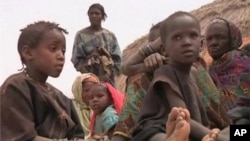Turmoil in Libya continues to threaten neighboring nations in the African Sahel. While international efforts are being made to end violence between rival governments battling powerful militias there, the region continues to face humanitarian crises and security challenges.
Millions have been driven from their homes by violence in Libya. Unrest stemming from terrorist actions in Mali and Nigeria, as well as violence in the Central African Republic, has contributed to instability and pressures elsewhere, such as in parts of Chad, Niger and Cameroon. Human, illegal drug and arms trafficking are up, as militant groups like Boko Haram, Ansar al-Sharia elements, and al-Qaeda in the Islamic Maghreb press ways to fund their operations.
A special United Nations envoy, Ethiopian diplomat Hiroute Sellassie, told the Security Council recently that countering these threats won’t be possible without much greater regional coordination.
Over all, the United States has provided over $275 million this year for humanitarian aid to the region.
The United States is fully committed to supporting regional counterterrorism efforts and to the wider promotion of stability across the Sahel. Recognizing the dangers to the region and beyond, the United States provides assistance to build the capacity of military, law enforcement, and civilian actors through the Trans-Sahara Counterterrorism Partnership and other initiatives.
We also remain committed to continuing our long-standing efforts to address the serious humanitarian and development challenges in the region. Over all, the United States has provided over $275 million this year for humanitarian aid to the region, focusing the largest portion on the humanitarian sectors most in need: agriculture and food insecurity, nutrition, and economic recovery.
The United States also helped launch in 2011 the Global Counterterrorism Forum. The Sahel Region Capacity Working Group under this forum promotes regional and international cooperation on key security and counterterrorism issues and provides a venue for experts to discuss gaps and identify solutions.
For these bilateral and multilateral programs to be truly successful, however, the governments in the region must also redouble their efforts to make institutional and governance reforms. These are critical pillars of the UN Sahel Strategy.
As seen in Burkina Faso recently, when political leaders turn their focus away from their commitment to constitutionally mandated processes such as democratic elections, then the government loses its legitimacy and the trust of its people. It becomes less stable, not more so.
No matter how much humanitarian assistance is provided, without important governance, rule of law, and democratic reforms contributing to greater security for the average citizen, no amount of international support will lead to the concrete positive gains that the people of the region desire, we all seek, and the region requires.














